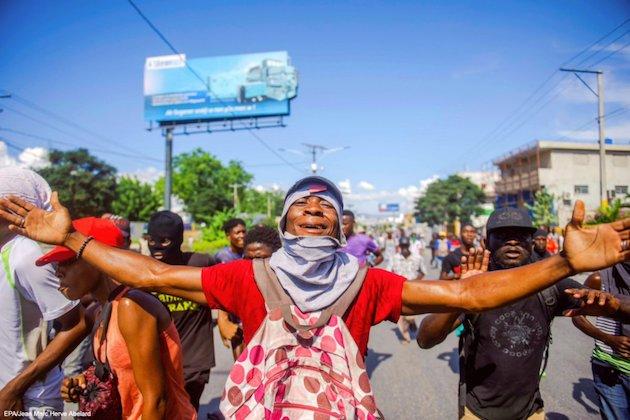Move FM Global News

Haitian president clinging to power as country continues to crumble
Nov 2, 2019PORT-AU-PRINCE, Haiti – Whilst the world has been absorbed with high-profile protests in various trouble-spots around the world, including Iraq, Chile and Lebanon, violent demonstrations have been gathering pace in Haiti.
Protests have been going on in this politically unstable country for the past sixteen months, with demands along the same lines as those in other countries under protest: widening corruption, poor economic conditions, and inequality.
On Friday the UN High Commission for Human Rights Michelle Bachelet, called on the government and opposition to address the grievances of the population, many of whom are calling for the president to stand aside.
The protests of late have turned ugly. Forty-two people have been killed and 86 injured, Bachelet said, in a statement from her Office (OHCHR).
“We are deeply concerned about the protracted crisis in Haiti, and its impact on the ability of Haitians to access their basic rights to healthcare, food, education and other needs” she said.
The political and humanitarian crisis stems from the struggle between President Jovenel Moise and a surging opposition movement, which coupled with economic struggle and corruption have led to soaring prices of basic goods, crumbling healthcare facilities, and pushed the country to the brink of collapse.
Local media reports say President Moise has indicated he has no intention of resigning.
The majority of victims suffered gunshot wounds, according to information received by (OHCHR), with 19 deaths at the hands of security forces, and others by armed demonstrators or unknown perpetrators. Among those killed, at least one was a journalist; nine other reporters have been injured, and many have reportedly been threatened. Ms. Bachelet urged all actors to refrain from targeting journalists, and respect the freedom of the media to do its job.
Children are missing school, while road blockades and violence have kept people from accessing sufficient food, drinking water, medicine and fuel, and the health sector “has been hit particularly hard, with shortage of electricity, fuel, supplies and the inability of many medical personnel to reach their places of work,” UN News said in a report.
The turmoil has also prompted closure of judicial institutions and other public entities, resulting in an “alarmingly high number” of inmates stuck in prolonged pre-trial detention.
Ms. Bachelet said she welcomed the launching of investigations by the General Inspectorate of the Haitain National Police into allegations of human rights violations by authorities, and stressed the need for investigators’ “thorough, transparent and independent” work, “with a view to ensuring accountability, justice and truth for victims and their families including through judicial action.”
After 15 years, the UN’s peacekeeping operations came to a close earlier this month. However, Secretary-General Antonio Guterres promised “continuous commitment” through the new UN Integrated Office in Haiti more commonly known as BINHUH.
The Office, which began operations two weeks ago on 16 October, serves in an advisory capacity, supporting Haitian authorities in and effort to bring about lasting peace and stability, as well as the benefits of the globally-agreed 2030 Sustainable Development Agenda.
Measures of support taken by all actors “is crucial” to resolving Haiti’s meltdown, Bachelet stressed. “We stand ready to support attempts at meaningful and inclusive resolution to the current situation and alleviate the suffering of the people of Haiti,” she added.


